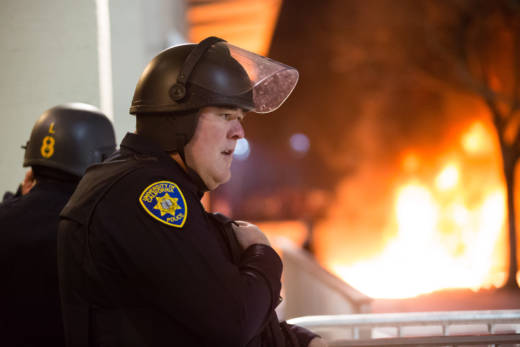Chief Greenwood requested the change saying Berkeley had become a battleground for what he called extremist groups and that police needed more tools.
Only a few people spoke in favor of the proposal. One unidentified woman said she had been chased and hit during a protest and that the police need more more support.
In his report to the Council, the Greenwood cited "a series of coordinated attacks by extremists in Berkeley [that] have resulted in violent riots, injuries and the destruction of property.”
He detailed several demonstrations this year, which featured violent clashes between what he described as large groups of masked anti-facists and right-wing protesters. Greenwood argued “the emergence of tactics involving weapons, shields and the large-scale, coordinated maneuver of large groups of masked individuals" ... require the Berkeley Police Department to be prepared and properly equipped “to protect free speech and keep our community safe.”
Fringe-right conservatives and white nationalists have descended on Berkeley this year -- making the home of the Free Speech Movement a flashpoint.
Greenwood brought black flags, sticks and shields to the meeting which, he said, police had confiscated at recent protests. He argued pepper spray would be a more effective police tool since shields cannot provide full protection against the chemical.
Greenwood came under repeated criticism at the meeting for never mentioning white supremacists or Nazis during his presentation. Resident Karen Ashely said the "city would not need pepper spray if there were no white supremacists allowed."
Scores of speakers echoed these sentiments -- many also criticizing the rush to alter a longstanding policy. People cited the potential medical harm from pepper spray and the possibility of the chemical spraying beyond its target.
Councilmembers Kriss Worthington, Cheryl Davila and Kate Harrison voted against the change. Harrison said the city is in "a cycle of reacting to events ... without really thinking through the consequences."
BPD has come under criticism for excessive use of force in recent years -- including during a 2014 Black Lives Matter protest. Harrison also raised questions about the effectiveness of pepper spray, which she said could lead someone to become more aggressive and create panic in a crowd situation.
But in the end, a majority voted to grant the police their request. It was needed, said Councilwoman Lori Droste "to deal with specific violent aggressors in our city ... in order to maintain public safety and peaceful expression of thought."
The police say they are gearing up for a series of protests this month, beginning Thursday night.
Read the full motion before the Berkeley City Council below.
Motion, Special Meeting Item # 1
Motion to re-affirm and further amend the Berkeley City Council’s policy regarding the use of pepper spray by the Berkeley Police Department as such use relates to crowd control, expression of First Amendment speech, and addressing acts of violence by specific individuals within a crowd, as follows (in bold):
Oleoresin Capsicum (pepper spray) shall not be used as a crowd control technique to disperse a crowd or move a crowd.
Pepper spray shall not be used on persons engaged in legal speech or other expression that is protected by the First Amendment, nor upon those committing unlawful acts by non-violent or passive resistance means, (e.g. sitting or lying down to block a street or doorway).
Police may use pepper spray upon specific individuals within a crowd who are committing acts of violence upon police or others.
